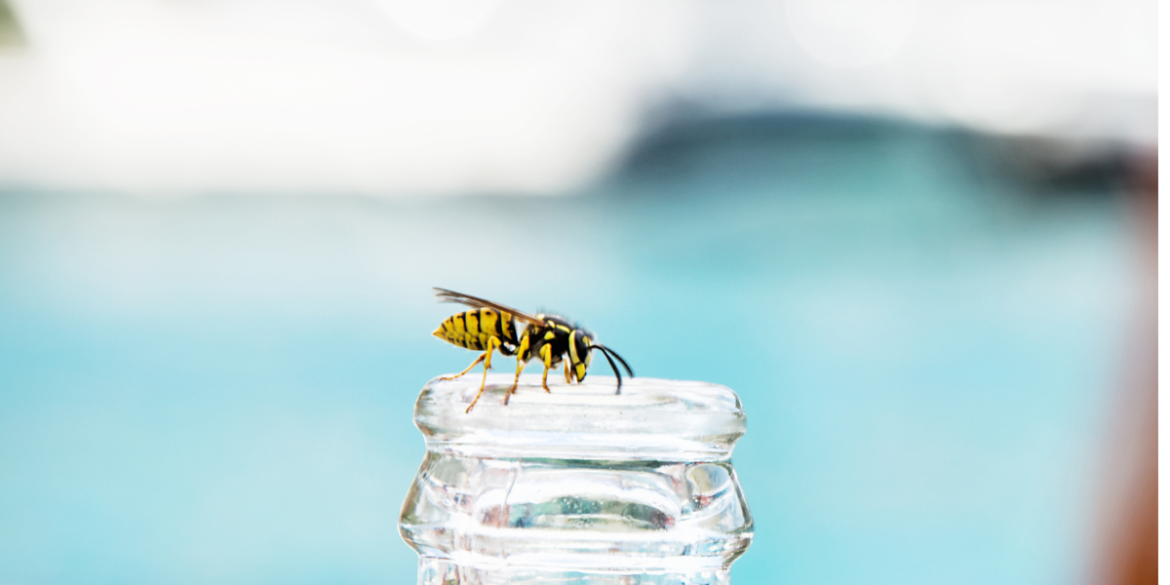Cleaning
How to Keep Wasps Away So You Can Enjoy Your Summer
As much as we love spending time in our gardens during summer, there is no denying that annoying wasps can ruin the fun. While traditional methods, like sprays and traps, can be effective, they often contain harmful chemicals we don’t want around our families and pets. This post discusses the many options available to keep wasps away from you and your property so you can have a worry-free summer.

Do you want to enjoy your summer without worrying about irritating wasps interrupting your outdoor activities? Then keep reading. Wasps can be a real nuisance. They buzz around our faces, ruin picnics and barbecues, disrupt our outdoor fun, and even put us at risk for possible stings. Though it’s impossible to eliminate wasp presence in your home or garden, several practical ways exist to make an area less attractive to these annoying creatures so they’ll leave you alone! This blog post will explore easy-to-follow tips to deter unwanted wasp activity around the house. So stay tuned and learn all the tricks of keeping those aggravating bugs away!
This post contains affiliate links, and The Organizer UK may earn commissions for purchases made through the links in this post. For more details, see here. Thank you so much for your support!
Wasp-repellant plants.
We’ll start with the most natural and safest option: plants! The smell of certain herbs, flowers, and foliage can act as a deterrent to wasps. Lavender is particularly effective in keeping insects away. Plant some around your patio area or hang sachets near your outdoor gathering spaces. Utilizing wasp-repelling plants is one solution that keeps wasps away and adds to our gardens’ beauty. Marigolds, mint, and citronella are some of the varieties of plants that emit strong smells when disturbed, deterring unwanted insects from buzzing around. The best part? These plants are natural, safe, and easy to grow, making it a win-win situation for any home improvement and garden project.
Essential oils
Citronella oil is also an excellent repellent for wasps. You can buy citronella candles like these or make your own by infusing olive oil with lemon, mint, or eucalyptus.
Eucalyptus, rosemary, and peppermint oils are also great wasp repellents. Place them in a spray bottle with some water and spray them around the outdoor area to create an invisible barrier and keep wasps away.
Insect curtains and zappers.
If you don’t have a garden or patio space, consider keeping in-room insect repellents such as insect curtains, insect-proof screens, and ultrasonic pest repellers like this one. These devices trap wasps and other flying insects and keep them away from your living space. Inspect your window coverings regularly, as they can catch pests such as wasps when left unchecked.
Fake wasp nests
Installing fake wasp nests like this one around your home can effectively scare away unwanted visitors who may be eyeing your property as a potential place to build nests. These clever deterrents mimic an actual wasp nest’s natural look and feel, usually enough to convince curious yellow jackets and wasps to stay away.

Seal off any openings and potential entry points.
As the saying goes, “An ounce of prevention is worth a pound of cure.” This rings especially true when it comes to protecting your home from wasps. Sealing off any potential entry points can be a game-changer for unwanted guests. One of the easiest and most effective ways to do this is using a caulk like this. By carefully inspecting your home and sealing any cracks or gaps, you’ll create a strong barrier against those pesky intruders.
Keep food sources covered and clean up quickly after eating outside.
Clean up any food or drink that could attract wasps. Place sealed containers outside during the summer, and make sure to have lids when needed.
Eating outside can be a fun and relaxing experience, but it’s important to remember to keep your food sources covered and clean. Not only does this help to prevent unwanted pests from getting into our food, but it’s also a hygienic practice that can protect our health. It only takes a few seconds to cover up your plate with these handy covers or put away any leftover food, but it can make a big difference in keeping your outdoor dining area clean and tidy. So whether you’re enjoying a picnic in the park or having a backyard barbecue, remember to take extra precautions to keep your food safe and secure.

Install yellow bug lights around the exterior of your home.
With warmer weather comes the influx of buzzing insects that can quickly turn your outdoor oasis into a nightmare. While wasps may be crucial in pollinating plants and flowers, their presence can be a nuisance and, in some cases, even harmful. One of the easiest and most effective methods of deterring these stinging pests is by installing yellow bug lights like these ones around the exterior of your home. These lights are designed to emit a specific wavelength of light that mosquitoes, flies, and, most importantly, wasps find unappealing. By swapping out your traditional white lightbulbs for these yellow-hued alternatives, you can relax and enjoy your backyard without the fear of wasps interrupting your fun in the sun.
Seal off any openings or potential entry points.
As the saying goes, “An ounce of prevention is worth a pound of cure.” This rings especially true when it comes to protecting your home from wasps. Sealing off any potential entry points can be a game-changer for unwanted guests. One of the easiest and most effective ways to do this is using a caulk like this. By carefully inspecting your home and sealing any cracks or gaps, you’ll create a strong barrier against those pesky intruders
Vaporub
Use a vapor rub like this one to deter wasps from entering your home. Vapor rub has a strong smell that wasps don’t like, so applying a small amount on window sills and door frames can help to keep them away. You can also create a homemade deterrent by mixing equal parts of water and vinegar with several drops of peppermint essential oil and then spraying it around the perimeter of your house. If you have any holes or entry points in your brickwork, you can smear vaporub around the hole to deter the wasps from building a nest.
Apple cider vinegar
Use apple cider vinegar as a wasp-repellant spray. Apple cider vinegar is an effective, natural way to repel wasps from your property. Simply mix one part apple cider vinegar and three parts water in a spray bottle, and spray around areas where you think wasps may be nesting or entering your home. The sharp smell of the vinegar will act as an irritant to the wasps and keep them away. Note that this should only be used as a preventative measure, not to eliminate existing wasps. For those, you will need to call a professional pest controller. You can also use other natural deterrents like lemon juice or garlic cloves. Simply mix the ingredients in equal parts and spray around windows, walls, and any entrances to your home.
Wasp traps
Use wasp traps like these to keep wasps away from your home. Wasp traps are effective tools for eliminating wasps as they contain an attractant that lures the insects into the trap, where they become trapped and eventually die. You can buy wasp traps at most garden centers or online here. Place them away from high-traffic areas, such as doorways or outdoor seating, to ensure you don’t accidentally trap beneficial insects or bees.
Keep the garden clean and tidy.
Cleaning up fallen fruit and bins near the area to prevent encouraging wasps. The most important thing is to take preventative measures to ensure that wasps do not return to the area. This can include ensuring bin bags of food waste are not left near the property, which will attract them (and rats). The aim is to create a more ‘inhospitable’ environment for the wasps.
Soapy water
A homemade soapy water solution is one of the most effective ways to keep wasps away. This natural remedy makes it difficult for the wasp to land and feed on flowers, fruit, or other food sources in your garden. Mix a few drops of liquid dish soap with one litre of warm water to make this solution. Then, spray this mixture on any plants or areas where you have seen wasps settling. Be sure to reapply every few days so that the solution stays effective. You may also wish to put a small bowl of soapy water in an area where wasps often frequent. This will provide them with an alternative water source and deter them from feeding elsewhere. A natural, biodegradable soap that won’t harm plants or the environment is important for best results.
How to keep wasps away from outside
Nothing is quite like sitting outside on a beautiful day and enjoying some much-needed fresh air. But when a wasp catches sight of you, that peaceful moment can quickly become a nightmare. While wasps are important for pollinating plants and controlling other pests, we don’t necessarily want them buzzing around us while we relax. So, how can we keep wasps away while still enjoying our garden? One simple solution is to place a sliced cucumber or lemon in a bowl near your seating area. The smell of these fruits is repulsive to wasps and will encourage them to buzz off!
It is important to take conscious steps to protect yourself and your family from the risks of being stung by a wasp. Do you have any tips to keep wasps away in the summer?

